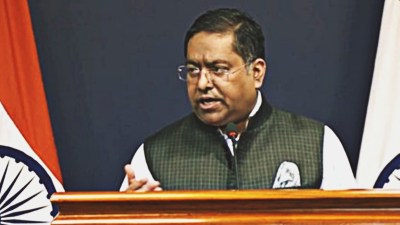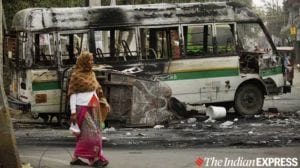Stay updated with the latest - Click here to follow us on Instagram
Flight carrying South Korean workers detained in Atlanta immigration raid leaves US
A total of 475 workers, including around 300 South Koreans, were rounded up in the September 4 raid at an under-construction battery factory.
 A plane takes off with Korean workers that were detained at Hartsfield-Jackson International Airport in Atlanta. (Photo: AP)
A plane takes off with Korean workers that were detained at Hartsfield-Jackson International Airport in Atlanta. (Photo: AP)A chartered flight carrying South Korean nationals detained during an immigration raid at Hyundai’s sprawling auto plant in Georgia has left the US on Thursday, officials said.
The Boeing 747-8i from Korean Air, carrying more than 300 South Koreans, departed for Seoul, a day after it was originally scheduled to take off.
 A Korean Air charter plane carrying Korean workers detained in immigration raid at Georgia factory leaves Hartsfield-Jackson International Airport in Atlanta bound for South Korea. (Photo: AP)
A Korean Air charter plane carrying Korean workers detained in immigration raid at Georgia factory leaves Hartsfield-Jackson International Airport in Atlanta bound for South Korea. (Photo: AP)
Disagreement over handcuffing detained workers
According to NPR, the delay was caused by US and South Korean officials disagreeing on the terms of their release.
South Korean officials had demanded that the workers be transported from a detention facility to the Atlanta airport without handcuffs or other physical restraints and that they would face no problems re-entering the United States in the future to work.
On Thursday, the South Koreans left the US without being handcuffed, unlike the previous deportations by the Trump administration.
Trump offered to allow South Korean workers to stay
The Associated Press reported that US President Donald Trump offered to allow the detained South Korean workers to stay in the United States, but only one has opted to remain.
According to South Korean officials, Trump’s overture sought to encourage the workers to stay and train Americans, resulting in a one-day delay to the departure of a chartered plane.
ICE raid at Hyundai plant
A total of 475 workers, including around 300 South Koreans, were rounded up in the September 4 raid at an under-construction battery factory jointly owned by Hyundai Motor and LG Energy Solution
Many of the detained workers are employees of subcontractors involved in the project. South Korean media also said a smaller number of Japanese and Chinese nationals had been arrested during the raid.
Raid puts South Korean investments at risk
While the raid has been trumpeted by US immigration authorities, it has threatened to destabilise ties at a time when both countries are seeking to finalise a trade deal, and to scare off South Korean investment in the United States which Trump has been so keen to secure.
“Our businesses that have entered the United States are likely in a state of serious confusion,” President Lee Jae Myung said at a news conference on Thursday marking his first 100 days in office.
In the wake of the raid, Washington and Seoul have agreed to discuss establishing a new visa category for Koreans, South Korean Foreign Minister Cho Hyun has said.
But current difficulties about sending staff to the US could affect direct investment. “Our businesses that are investing in the United States will no doubt be very hesitant,” Lee said.



- 01
- 02
- 03
- 04
- 05




























